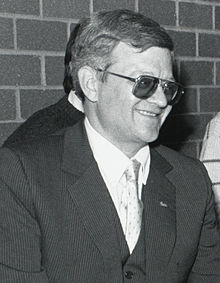Author Tom Clancy died earlier this week on October 2nd at the age of just 66. During his writing career he reinvented and popularized the genre known as the techno-thriller.
 You can read all about Clancy’s life elsewhere; my purpose today is to mention how he and his work influenced me.
You can read all about Clancy’s life elsewhere; my purpose today is to mention how he and his work influenced me.
When his first book, The Hunt for Red October was published in 1984, I was completing my first (and last) tour as an officer aboard a submarine and headed for two years of shore duty.
The novel didn’t really become popular at first, but the publisher, U.S. Naval Institute Press, was used to leaving books out and available for longer periods than traditional fiction presses were. Good thing, too, because the book eventually caught on and became a best-seller.
The U.S. Navy benefited from that novel, I think, because it popularized the military at a time when it still suffered from the post-Vietnam stigma, and it rode the wave of the expansion of the military led by then-President Reagan. It was a heady time for the submarine service.
I recall a cartoon at the time depicting a young woman addressing a naval officer seated at a bar table, drinking beer. He wore sunglasses and had winged aviation insignia on his uniform. She was asking, “Are you a submariner, like those guys in Red October?” and he responded, “Yeah, babe.” The caption read, “The first recorded instance of an aviator impersonating a submariner.”
I enjoyed the book, and my familiarity with submarines probably heightened my appreciation for it. I went on to read the first six of Clancy’s books, through The Sum of All Fears. Although Hunt is the shortest of his works (I think), readers should not be intimidated by the length of his novels, for they are split up into short sections and chapters, and Clancy writes with considerable tension so that you won’t want to stop reading.
In the mid 1990’s, when Tom Clancy’s fame was assured, he actually spoke to the local writing group in my area, of which I was a member. He waived his usual speaking fee, which was probably thousands of dollars. Unfortunately for me, I was away on travel for my day job at that time and missed his talk. I heard it went well and that he was inspiring.
As I mentioned, Clancy took the genre of techno-thriller to new heights. Some complain about the lengthy paragraphs he devotes to describing how technology works. But as an engineer, I never minded that. I disagree with those who assert that technology itself becomes a character in Clancy’s novels. He well knew that people operate technology, and he created memorable characters who had been well trained to work with the sophisticated equipment.
In fact, Clancy lavished much attention on those lowest in the military hierarchy. His novels are filled with enlisted men from humble backgrounds who operate complex machinery with skill and great competence. I think he greatly admired American enlisted men and women, and at one point I believe he said they were the real difference between the U.S. and Soviet militaries. He said you’d expect officers from both countries to be top-notch, and they were, but it’s the American enlisted who far exceeded their Soviet counterparts.
Almost all of my stories deal with characters grappling with technology, too. Moreover, many of my characters are low on the social pecking order, as are Clancy’s enlisted characters. None of my works can be called techno-thrillers, but I think Clancy’s works did influence mine in some way.
Rest in peace, Mr. Clancy, and thanks for the pulse-pounding excitement! You gave many enjoyable hours to millions, and to—
Poseidon’s Scribe
